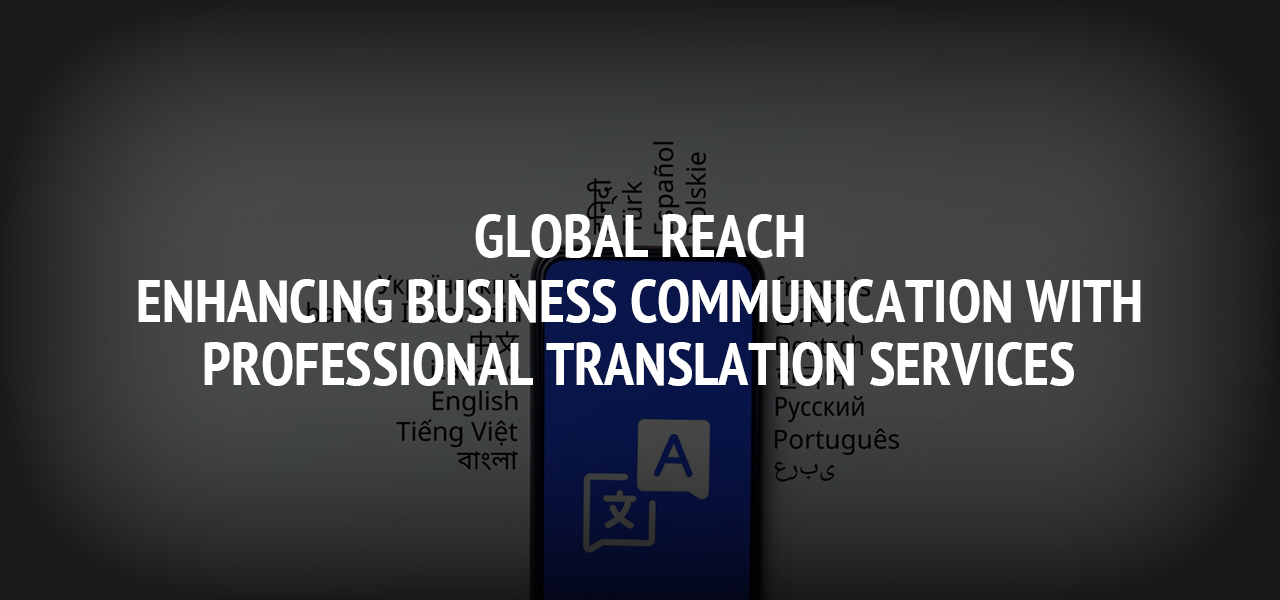Global Reach: Enhancing Business Communication with Professional Translation Services

In today's interconnected world, businesses are no longer confined by geographical borders. With the rise of globalization, companies of all sizes have the opportunity to expand their reach and tap into new markets across the globe. However, with this expansion comes the challenge of effective communication across languages and cultures. This is where professional translation services play a crucial role. In this article, we will explore how professional translation services can enhance business communication and facilitate international growth.
The Importance of Effective Communication in Global Business
Communication serves as the cornerstone of successful business operations. It facilitates collaboration among team members, enables efficient negotiations with partners and suppliers, and ensures satisfactory interactions with customers. In a global context, effective communication becomes even more critical as businesses interact with diverse stakeholders from different linguistic and cultural backgrounds.
Multilingual communication presents its own set of challenges. Language barriers can hinder understanding and lead to misinterpretations, delays, or even costly mistakes. Cultural differences further complicate matters, as what may be acceptable or appropriate in one culture could be perceived differently in another. Check out Vietnamese translation services to get started.
Professional Translation Services: An Overview
Professional translation services offer a comprehensive solution to overcome language and cultural barriers in global business communication. These services encompass a range of offerings, including document translation, interpretation, and localization.
Unlike automated translation tools, which rely on algorithms to translate text, professional translation services employ human translators who possess linguistic expertise and cultural awareness. This human touch ensures accuracy, nuance, and context in translations, making them more reliable and effective in conveying the intended message.
Benefits of Professional Translation Services
One of the primary benefits of professional translation services is the assurance of accuracy and quality. Human translators meticulously translate content while paying attention to grammar, syntax, and context. Additionally, these services often incorporate quality control measures, such as proofreading and editing, to ensure the final output meets the highest standards.
Professional translators are adept at navigating cultural nuances and adapting content to resonate with target audiences. This process, known as localization, goes beyond literal translation to ensure that the message remains culturally relevant and appropriate. By respecting cultural sensitivities and preferences, businesses can establish stronger connections with their global audience.
Delivering content in customers' native languages enhances their overall experience and fosters trust and loyalty. Whether it's product information, marketing materials, or customer support, providing content in multiple languages demonstrates a commitment to meeting customers' needs and preferences. This, in turn, can lead to increased satisfaction and loyalty among international customers.
Choosing the Right Translation Service
When choosing a translation service provider, consider factors such as their expertise in your industry, the languages they support, their track record of delivering quality translations, and their ability to meet deadlines.
Gauge the quality and reliability of translation services by reviewing sample translations, seeking recommendations from trusted sources, and verifying the credentials and experience of the translators. Look for providers that offer transparent communication, responsive customer support, and a commitment to meeting your specific needs.
While cost is undoubtedly a factor, it should not be the sole determinant in choosing a translation service provider. Instead, focus on value for money by considering the quality of translations, the level of service provided, and the potential impact on your business outcomes.
Integrating Translation Services into Business Strategy
Incorporate translation services into your strategic planning process by identifying target markets, languages, and key messages. Align translation efforts with your business goals and objectives to ensure consistency and coherence in your global communication strategy.
Work closely with your chosen translation service provider to implement translation solutions seamlessly into your day-to-day operations. Establish clear communication channels, provide access to relevant resources, and foster collaboration between internal teams and external partners.
Define metrics to evaluate the effectiveness of your translation efforts, such as increased website traffic, higher conversion rates, or improved customer satisfaction scores. Track these metrics over time to measure the return on investment (ROI) of professional translation services and make data-driven decisions to optimize your strategy.
Future Trends in Translation Services
Advancements in artificial intelligence (AI) and machine learning are revolutionizing the field of translation. Machine translation tools are becoming increasingly sophisticated, complementing the work of human translators and streamlining the translation process. However, human expertise will remain essential for complex translations that require nuance and cultural understanding.
As businesses continue to expand into new markets and demographics, the demand for translation services will continue to grow. This will necessitate the development of new language pairs, specialized expertise in niche industries, and innovative solutions to address the evolving needs of global businesses.
Conclusion
In an increasingly globalized world, effective communication is essential for businesses to thrive. Professional translation services offer a reliable solution to overcome language and cultural barriers, enabling businesses to reach new audiences and unlock international growth opportunities. By investing in professional translation services and integrating them into their broader business strategy, companies can enhance their global reach and maximize their competitive advantage in today's interconnected marketplace.
About The Author
Related Blog
View All-
The Benefits of Outsourcing Telecom Expense Management for Businesses
For companies across the spectrum, effectively managing telecommunications costs is becoming increasingly crucial in a technology-driven market. Outsourcing telecom expense management services can prove to be a strategic move for businesses looking to optimize ...
-
Stuck at Home? Try These 6 Apps To Entertain You During Self-Isolation
As pretty much the entire world heads into or is already in some form of self-isolation, the boredom can become seriously real. But at least we’ve got our mobile phones and the internet - I mean, imagine if this happened in the 90’s? We’d all ...







